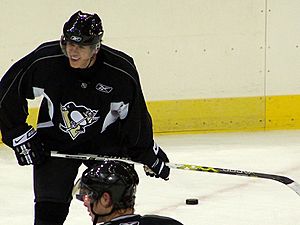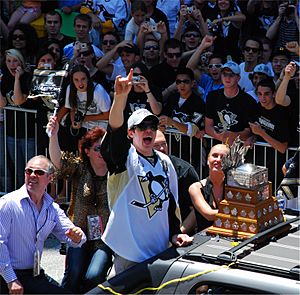Evgeni Malkin facts for kids
Quick facts for kids Evgeni Malkin |
|||
|---|---|---|---|
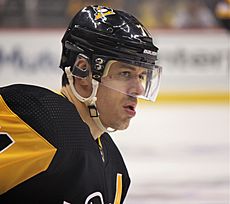
Malkin with the Pittsburgh Penguins in April 2019
|
|||
| Born | 31 July 1986 Magnitogorsk, Russian SFSR, Soviet Union |
||
| Height | 6 ft 5 in (196 cm) | ||
| Weight | 210 lb (95 kg; 15 st 0 lb) | ||
| Position | Centre | ||
| Shoots | Left | ||
| NHL team Former teams |
Pittsburgh Penguins Metallurg Magnitogorsk |
||
| National team | |||
| NHL Draft | 2nd overall, 2004 Pittsburgh Penguins |
||
| Playing career | 2003–present | ||
Evgeni Vladimirovich Malkin (Russian: Евге́ний Влади́мирович Ма́лкин; born July 31, 1986) is a Russian professional ice hockey player. He plays as a centre and is an alternate captain for the Pittsburgh Penguins in the National Hockey League (NHL). People often call him "Geno." Malkin started his hockey journey with his hometown team, Metallurg Magnitogorsk, playing for both their junior and senior teams. He was picked second overall in the 2004 NHL entry draft by the Pittsburgh Penguins. However, a disagreement about his transfer meant he couldn't start his NHL career until 2006.
After his first season with the Penguins, Malkin won the Calder Memorial Trophy. This award goes to the NHL's best new player. In his second season, he helped Pittsburgh reach the 2008 Stanley Cup Finals. He was also a top contender for the Hart Memorial Trophy, given to the league's most valuable player. The next season, Malkin won the Art Ross Trophy for leading the NHL in points. He and the Penguins made it to the Stanley Cup Finals again, and this time they won the Stanley Cup championship! Malkin was named the Conn Smythe Trophy winner as the most valuable player of the playoffs. In 2012, Malkin won the Hart Trophy and the Ted Lindsay Award. This award is voted on by the players themselves. He also won the Art Ross Trophy for a second time, leading the league by a large margin.
Malkin has also played for Russia in many international tournaments. As a junior player, he competed in two IIHF World U18 Championships and three World Junior Championships. He won one gold, two silver, and one bronze medal. In 2006, he was named the MVP of the World Junior tournament. As an adult player, he has played in four IIHF World Championships. He won gold twice and was named the tournament MVP in 2012. Malkin has also played for Russia in three Winter Olympic Games: in Turin (2006), Vancouver (2010), and Sochi (2014). In 2020, he was chosen for the IIHF All-Time Russia Team.
Contents
About Evgeni Malkin's Life
Malkin was born on July 31, 1986, in Magnitogorsk, Russia. His parents are Vladimir and Natalia Malkin. His father, Vladimir, worked at a large steel factory and also played hockey in the Metallurg Magnitogorsk youth system. Evgeni has an older brother named Denis. Malkin started skating when he was three years old. He joined his first organized hockey league two years later. He was very good at the sport from a young age.
Malkin owns a restaurant in Magnitogorsk. It was once designed to look like the inside of a prison. However, it has since been updated by new owners.
In November 2015, Malkin got engaged to Anna Kasterova, a Russian television personality. Their son was born on May 31, 2016.
In November 2017, Malkin joined a social movement called PutinTeam. This group was started by fellow NHL player Alexander Ovechkin. It supports President of Russia Vladimir Putin. Malkin said they wanted to show their support because of the World Cup in Russia and upcoming elections.
Evgeni Malkin's Hockey Journey
Starting His Career
Malkin grew up playing in the Metallurg Magnitogorsk hockey program. He first played in the Russian Superleague during the 2003–04 season when he was 17. He also played for Russia internationally in the 2003 IIHF World U18 Championships. There, he played on the top line with Alexander Ovechkin. Their team won the bronze medal.
Joining the NHL
After his first professional season in Russia, the Pittsburgh Penguins picked Malkin second overall in the 2004 NHL entry draft. He was chosen right after his Russian teammate, Alexander Ovechkin. However, there was a disagreement between the NHL and the International Ice Hockey Federation (IIHF) about his transfer. This delayed his start with Pittsburgh. He would have stayed in Russia anyway because of the 2004–05 NHL lockout.
On August 7, 2006, it seemed Malkin had agreed to stay in Russia until May 2007. But Malkin said he signed the contract because of "psychological pressure." He really wanted to play in the NHL. So, he left Metallurg Magnitogorsk's training camp in Helsinki on August 12. It was reported that his team had taken his passport to stop him from leaving. But he got it back and was able to leave Finland. He met with his agent, J. P. Barry, and they waited for his visa to the U.S.
To legally leave his team, Malkin sent a fax on August 15. He used a law that let him cancel his one-year contract with two weeks' notice. Once he was free from his Russian team, he signed a contract with the Penguins on September 5, 2006.
After Malkin's first NHL game, his old Russian team sued the NHL and the Penguins. They claimed Malkin was still under contract in Russia. But a judge allowed Malkin to keep playing in the NHL. The lawsuit was later dismissed.
Playing for the Pittsburgh Penguins (2006–Present)
Early Success and First Stanley Cup (2006–2009)
In his first pre-season game with the Penguins on September 20, 2006, Malkin hurt his shoulder. This made him miss the start of the season. His NHL debut was on October 18 against the New Jersey Devils. He scored his first goal against Martin Brodeur. Malkin set an NHL record by scoring a goal in each of his first six games. No player had done this since the NHL's first season in 1917–18. Malkin's scoring streak ended on November 4 in his seventh game.
Playing with another talented player, Sidney Crosby, Malkin finished his first season with 33 goals and 52 assists. He had 85 points in 78 games. He led all new players in scoring. He won the Calder Memorial Trophy as the NHL's best rookie. He was the second Penguin to win this award, after Mario Lemieux in 1985. Malkin was soon named an alternate captain for the Penguins. When Malkin first came to the U.S., he didn't speak much English. But with help from his Russian teammate Sergei Gonchar, he learned to give short interviews.
In his second NHL season (2007–08), Malkin scored his first NHL hat-trick on January 3, 2008, against the Toronto Maple Leafs. He scored three goals again on January 14 against the New York Rangers. When captain Sidney Crosby was injured, Malkin stepped up. He scored 44 points in the 28 games Crosby missed. Malkin finished the season second in NHL scoring with 106 points. He was six points behind Alexander Ovechkin.
Malkin continued to play great in the Stanley Cup playoffs. The Penguins reached the 2008 Stanley Cup Finals. He scored 22 points in 20 playoff games. But the Penguins lost to the Detroit Red Wings in six games. Malkin was nominated for the Hart Memorial Trophy as NHL MVP. He was also named to the First Team All-Star.
On July 2, 2008, Malkin signed a five-year contract extension with Pittsburgh. He started the 2008–09 season by getting his 200th NHL point. This happened on October 18, 2008, against the Toronto Maple Leafs. The goal was also Crosby's 100th career goal and 300th career point. Crosby had the puck cut in half so both players could keep a piece.
Malkin was voted as a starter for the 2009 NHL All-Star Game. He won the shooting accuracy contest. He had finished second to Alexander Ovechkin for the Art Ross Trophy the season before. But this time, Malkin won the scoring title with 113 points. He was the second Russian-born player to win it. On June 12, 2009, the Penguins won the Stanley Cup. They beat the Detroit Red Wings 2–1 in Game 7 of the Finals. Malkin had 36 points (14 goals and 22 assists) in the playoffs. He was the first player since Mario Lemieux in 1992 to lead both the regular season and playoffs in scoring. His 36 points were the most in the playoffs since Wayne Gretzky in 1993. Malkin won the Conn Smythe Trophy as playoff MVP. He was the first Russian-born player to do so.
Winning the Hart Trophy and Playoff Challenges (2009–2015)
On October 28, 2009, Malkin hurt his shoulder. This made him miss seven games. On March 21, 2010, he hurt his foot, missing seven more games. Malkin played 67 games in the 2009–10 season. He scored 28 goals and 49 assists for 77 points. The Penguins entered the 2010 playoffs as defending champions. They beat the Ottawa Senators in the first round. But they were then upset by the Montreal Canadiens in seven games.
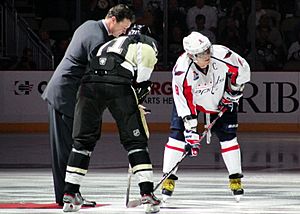
On February 4, 2011, Malkin returned to play after missing games due to a knee injury. In the second period, a player from the Buffalo Sabres collided with Malkin. He injured his right knee, tearing both his anterior cruciate ligament (ACL) and medial collateral ligament (MCL). On February 9, it was announced Malkin would need knee surgery. The Penguins expected him to recover in six months. He missed the rest of the 2010–11 season and playoffs. In Malkin's absence, the Penguins lost in the first round of the 2011 playoffs.

Malkin had a great season in 2011–12. With Sidney Crosby playing only 22 games due to injury, Malkin led the Penguins. He scored 50 goals for the first time in his career. He also had 59 assists, winning his second scoring title with 109 points in 75 games. He was the only NHL player to score at least 100 points that season. Malkin won the Hart Trophy as the NHL's MVP. He also won the Ted Lindsay Award, voted by the players. Despite Malkin's amazing season, the Penguins were eliminated in the first round of the 2012 playoffs by the Philadelphia Flyers. Malkin scored eight points in six games. After the playoffs, Malkin played for Russia at the 2012 World Championships.
The start of the 2012–13 NHL season was delayed by a lockout. Malkin went to Russia and played for his old team, Magnitogorsk, which had joined the Kontinental Hockey League (KHL). By the time the lockout ended in January 2013, Malkin was second in KHL scoring with 65 points in 37 games. He missed the end of the KHL season due to injuries. Malkin played 31 games in the NHL season, scoring 33 points. In the 2013 playoffs, the Penguins beat the New York Islanders and Ottawa Senators. Malkin had 11 points in the Islanders series. But the Penguins were then swept by the Boston Bruins in the Eastern Conference Finals. Malkin did not score any points in that series.
In the 2013–14 season, Malkin missed 22 games due to various injuries. In the 60 games he played, he scored 23 goals and 49 assists for 72 points. This was second on the Penguins behind Sidney Crosby. In the 2014 playoffs, the Penguins beat the Columbus Blue Jackets. Malkin scored a hat-trick in Game 6 to help his team win. In the next round, the Penguins lost to the New York Rangers in seven games. Malkin had a good series, scoring three goals and seven points.
On October 30, 2014, Malkin recorded his 400th assist. He became the fifth player in Penguins history to reach this mark. On April 22, 2015, Malkin played his 100th career playoff game. He was the fifth Penguin to do so. The Penguins lost to the New York Rangers in five games in the 2015 playoffs.
Winning Back-to-Back Stanley Cups (2015–2024)
Malkin had an injury-filled 2015–16 season. He missed 10 games in February 2016 due to a lower-body injury. On March 11, he suffered another injury after colliding with a player from the Columbus Blue Jackets. This injury made him miss the rest of the season and the first playoff game. He finished the season with 27 goals and 31 assists for 58 points in 57 games.
The Penguins beat the New York Rangers, Washington Capitals, and Tampa Bay Lightning in the playoffs. They then defeated the San Jose Sharks in six games in the 2016 Stanley Cup Finals. The Penguins won the Stanley Cup for the first time since 2009. Malkin had six goals and 12 assists for 18 points in 23 playoff games.
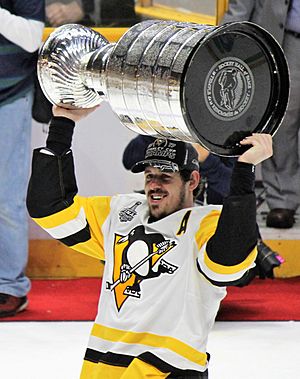
On October 29, 2016, Malkin scored his 300th career NHL goal. On February 17, 2017, he recorded his 500th career assist. He finished the 2016–17 season with 33 goals and 39 assists for 72 points in 62 games. He became the 29th player in NHL history to get 150 points in the playoffs. He led the team and the league with 28 points (10 goals, 18 assists) in the 2017 playoffs. The Penguins won the Stanley Cup again, repeating as champions!
Malkin had a healthy and successful 2017–18 season. He finished with 98 points (42 goals, 56 assists) in 78 games. On April 15, 2018, Malkin recorded his 100th career playoff assist. The Penguins beat the Philadelphia Flyers in six games. But they then lost to the Washington Capitals in the second round. The Capitals went on to win the Stanley Cup.
On January 30, 2019, Malkin suffered a hand injury. Despite this, he finished the game and had two assists. He also got into a fight with Steven Stamkos. After missing four games, Malkin returned. On March 12, Malkin reached his 1,000th NHL point. He became the 88th player in league history to do so. Malkin finished the 2018–19 season with 21 goals and 51 assists for 72 points in 68 games. The Penguins were swept by the New York Islanders in the first round of the 2019 playoffs.
On March 16, 2021, Malkin suffered a minor knee injury. This made him miss 23 games. He returned for the last four games of the pandemic-shortened 2020–21 season. He finished with eight goals and 20 assists for 28 points in 33 games. He re-injured his knee in the last game of the season. This caused him to miss the first two games of the 2021 playoffs. Malkin returned for Game 3, but the Penguins lost to the New York Islanders in six games.
Malkin had knee surgery in the 2021 off-season. He missed the first 32 games of the 2021–22 season. He made his season debut on January 11, 2022, scoring two goals and an assist. On April 11, Malkin was suspended for four games for cross-checking a player. He finished the season with 20 goals and 22 assists for 42 points in 41 games. The Penguins lost in the first round of the 2022 playoffs to the New York Rangers in seven games.
On July 12, 2022, Malkin signed a four-year contract extension to stay with the Penguins. He played his 1,000th NHL game on November 23 against the Chicago Blackhawks. He and Sidney Crosby are the only players to play all 1,000 games with the Penguins. Malkin played all 82 games in the 2022–23 season. He had 83 points (27 goals, 56 assists). The Penguins missed the playoffs for the first time since 2006. This was also the first time in Malkin's career that he missed the playoffs.
Malkin scored 27 goals and 40 assists for 67 points in all 82 games of the 2023–24 season. The Penguins missed the playoffs for the second year in a row.
Recent Milestones (2024–Present)
The start of the 2024–25 season was full of milestones for Malkin. On October 10, 2024, Malkin recorded his 800th career assist. He became the 34th player in league history to reach this mark. Two days later, Malkin recorded his 1,300th NHL point. He became the 37th player in league history to reach this mark. On October 16, Malkin scored his 500th career goal. He became the 48th player in league history to reach this mark. He was also the 24th player to score 500 goals with just one team. He ended the season with 16 goals and 34 assists for 50 points in 68 games. The Penguins missed the playoffs again.
How Evgeni Malkin Plays
Malkin is known as a center with amazing offensive skills. He is also good at playing defense. Sometimes, he plays on the wing or helps out on the power play. He is a strong skater with good balance and speed. In his best years, Malkin was a physical player. He would deliver big hits and wasn't afraid of contact. He uses his hockey smarts and athleticism to avoid opponents' checks. Malkin is a very emotional player. His emotions can help his game or sometimes lead to "bad" penalties. He has many different types of shots (slap, wrist, backhand, and snap). He is also great at stick-handling. Malkin is an excellent passer who knows how to create space on the ice. He can skate the length of the ice to score goals because of his speed, size, and great stick-handling.
"He's so big and strong and he doesn't mind the physicality. That's what separates him apart from other players that are gifted offensive players. He wants the puck all the time and he'll go through a check or take a check to make a play."
"He's just one of those guys that wants the puck all the time. For me, it was get him the puck as much as possible. With his ability to feed me and my ability to shoot the puck, it worked really well. I just got open as much as I could. I'd just get him the puck as fast as I could because I knew I was going to get it back wherever I was on the ice, it was coming back."
International Hockey for Russia
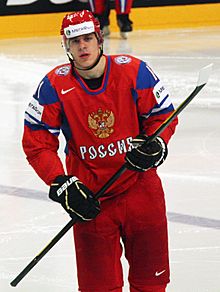 Malkin during the 2012 World Championships |
||
| Medal record | ||
|---|---|---|
| Men's ice hockey | ||
| Representing |
||
| World Championships | ||
| Gold | 2012 Finland/Sweden | |
| Gold | 2014 Belarus | |
| Silver | 2010 Germany | |
| Silver | 2015 Czech Republic | |
| Bronze | 2005 Austria | |
| Bronze | 2007 Russia | |
| Bronze | 2019 Slovakia | |
| World Junior Championships | ||
| Silver | 2005 United States | |
| Silver | 2006 Canada | |
| World U18 Championships | ||
| Gold | 2004 Belarus | |
| Bronze | 2003 Russia | |
Malkin first played for Russia at the 2003 IIHF World U18 Championships. He helped Russia win a bronze medal, scoring nine points. He was the captain for Russia's U18 team in 2004. They won a gold medal that year.
Before his second U18 tournament, Malkin played for Russia's under-20 team at the 2004 World Junior Championships. He scored five points, but Russia didn't win a medal. The next year, Malkin was second in scoring for Russia at the 2005 World Junior Championships. Russia won silver, losing to Canada in the final. Later in 2005, Malkin played for the Russian men's team at the 2005 World Championships. He helped Russia win a bronze medal.
In 2006, Malkin played in three big tournaments for Russia. He was named the best forward and MVP of the 2006 World Junior Championships. He captained Russia to another silver medal, again losing to Canada. Less than two months later, Malkin was chosen for Team Russia for the 2006 Winter Olympics in Turin. He helped the team finish fourth. Then in May, Malkin played in the 2006 World Championship. He led Russia in scoring with nine points.
After his first NHL season, Malkin played for Russia at the 2007 World Championships. He scored a personal best of ten points. He played on the first line with Ilya Kovalchuk and Alexander Frolov. He also won his second World Championships bronze medal.
2010 was a great year for Malkin internationally. He was chosen for the Russian Olympic Team at the 2010 Vancouver Olympic Games. He led all players in points per game. Russia lost to Canada in the quarter-finals. Malkin then joined the Russian team for the 2010 IIHF World Championship. He scored five goals and two assists in five games. He won his first World Championships silver medal.
Malkin was named MVP and the best forward at the 2012 IIHF World Championship. He scored 11 goals and 8 assists, totaling 19 points. He scored at least one point in every game. He also had two hat-tricks. Russia won the gold medal. His 19 points set a new record for Russian players at the World Championships.
In 2014, Malkin was on the 2014 Russian Olympic Ice Hockey Team. He played all five games for Russia. They finished fifth after losing to Finland. Malkin had one goal and two assists.
In 2019, Malkin played in the 2019 IIHF World Championship. He helped Russia win against Team USA. Russia then lost to Finland in the semifinal and won a bronze medal.
In 2020, Malkin was named to the IIHF All-Time Russian National Team. This included both Russian and Soviet legends.
Career Statistics
Regular Season and Playoffs
Bold indicates led league
| Regular season | Playoffs | |||||||||||||
|---|---|---|---|---|---|---|---|---|---|---|---|---|---|---|
| Season | Team | League | GP | G | A | Pts | PIM | GP | G | A | Pts | PIM | ||
| 2002–03 | Metallurg–2 Magnitogorsk | RUS-3 | 28 | 8 | 6 | 14 | 18 | — | — | — | — | — | ||
| 2003–04 | Metallurg Magnitogorsk | RSL | 34 | 3 | 9 | 12 | 12 | — | — | — | — | — | ||
| 2003–04 | Metallurg–2 Magnitogorsk | RUS-3 | 2 | 1 | 0 | 1 | 8 | — | — | — | — | — | ||
| 2004–05 | Metallurg Magnitogorsk | RSL | 52 | 12 | 20 | 32 | 24 | 5 | 0 | 4 | 4 | 0 | ||
| 2004–05 | Metallurg–2 Magnitogorsk | RUS-3 | 2 | 1 | 1 | 2 | 2 | — | — | — | — | — | ||
| 2005–06 | Metallurg Magnitogorsk | RSL | 46 | 21 | 26 | 47 | 46 | 11 | 5 | 10 | 15 | 41 | ||
| 2006–07 | Pittsburgh Penguins | NHL | 78 | 33 | 52 | 85 | 80 | 5 | 0 | 4 | 4 | 8 | ||
| 2007–08 | Pittsburgh Penguins | NHL | 82 | 47 | 59 | 106 | 78 | 20 | 10 | 12 | 22 | 24 | ||
| 2008–09 | Pittsburgh Penguins | NHL | 82 | 35 | 78 | 113 | 80 | 24 | 14 | 22 | 36 | 51 | ||
| 2009–10 | Pittsburgh Penguins | NHL | 67 | 28 | 49 | 77 | 100 | 13 | 5 | 6 | 11 | 6 | ||
| 2010–11 | Pittsburgh Penguins | NHL | 43 | 15 | 22 | 37 | 18 | — | — | — | — | — | ||
| 2011–12 | Pittsburgh Penguins | NHL | 75 | 50 | 59 | 109 | 70 | 6 | 3 | 5 | 8 | 6 | ||
| 2012–13 | Metallurg Magnitogorsk | KHL | 37 | 23 | 42 | 65 | 58 | — | — | — | — | — | ||
| 2012–13 | Pittsburgh Penguins | NHL | 31 | 9 | 24 | 33 | 36 | 15 | 4 | 12 | 16 | 26 | ||
| 2013–14 | Pittsburgh Penguins | NHL | 60 | 23 | 49 | 72 | 62 | 13 | 6 | 8 | 14 | 8 | ||
| 2014–15 | Pittsburgh Penguins | NHL | 69 | 28 | 42 | 70 | 60 | 5 | 0 | 0 | 0 | 0 | ||
| 2015–16 | Pittsburgh Penguins | NHL | 57 | 27 | 31 | 58 | 65 | 23 | 6 | 12 | 18 | 18 | ||
| 2016–17 | Pittsburgh Penguins | NHL | 62 | 33 | 39 | 72 | 77 | 25 | 10 | 18 | 28 | 53 | ||
| 2017–18 | Pittsburgh Penguins | NHL | 78 | 42 | 56 | 98 | 87 | 9 | 4 | 4 | 8 | 16 | ||
| 2018–19 | Pittsburgh Penguins | NHL | 68 | 21 | 51 | 72 | 89 | 4 | 1 | 2 | 3 | 6 | ||
| 2019–20 | Pittsburgh Penguins | NHL | 55 | 25 | 49 | 74 | 58 | 4 | 0 | 1 | 1 | 6 | ||
| 2020–21 | Pittsburgh Penguins | NHL | 33 | 8 | 20 | 28 | 24 | 4 | 1 | 4 | 5 | 8 | ||
| 2021–22 | Pittsburgh Penguins | NHL | 41 | 20 | 22 | 42 | 24 | 7 | 3 | 3 | 6 | 6 | ||
| 2022–23 | Pittsburgh Penguins | NHL | 82 | 27 | 56 | 83 | 82 | — | — | — | — | — | ||
| 2023–24 | Pittsburgh Penguins | NHL | 82 | 27 | 40 | 67 | 70 | — | — | — | — | — | ||
| 2024–25 | Pittsburgh Penguins | NHL | 68 | 16 | 34 | 50 | 42 | — | — | — | — | — | ||
| NHL totals | 1,213 | 514 | 832 | 1,346 | 1,202 | 177 | 67 | 113 | 180 | 242 | ||||
International Play
| Year | Team | Event | GP | G | A | Pts | PIM | |
|---|---|---|---|---|---|---|---|---|
| 2003 | Russia | WJC18 | 6 | 5 | 4 | 9 | 2 | |
| 2004 | Russia | WJC | 6 | 1 | 4 | 5 | 0 | |
| 2004 | Russia | WJC18 | 6 | 4 | 4 | 8 | 31 | |
| 2005 | Russia | WJC | 6 | 3 | 7 | 10 | 16 | |
| 2005 | Russia | WC | 9 | 0 | 4 | 4 | 8 | |
| 2006 | Russia | WJC | 6 | 4 | 6 | 10 | 12 | |
| 2006 | Russia | OLY | 7 | 2 | 4 | 6 | 31 | |
| 2006 | Russia | WC | 7 | 3 | 6 | 9 | 6 | |
| 2007 | Russia | WC | 9 | 5 | 5 | 10 | 6 | |
| 2010 | Russia | OLY | 4 | 3 | 3 | 6 | 0 | |
| 2010 | Russia | WC | 5 | 5 | 2 | 7 | 10 | |
| 2012 | Russia | WC | 10 | 11 | 8 | 19 | 4 | |
| 2014 | Russia | OLY | 5 | 1 | 2 | 3 | 2 | |
| 2014 | Russia | WC | 4 | 2 | 1 | 3 | 2 | |
| 2015 | Russia | WC | 9 | 5 | 5 | 10 | 8 | |
| 2016 | Russia | WCH | 4 | 1 | 2 | 3 | 2 | |
| 2019 | Russia | WC | 10 | 1 | 5 | 6 | 4 | |
| Junior totals | 30 | 17 | 25 | 42 | 61 | |||
| Senior totals | 83 | 39 | 47 | 86 | 81 | |||
Awards and Honors
NHL Awards
| Award | Year |
|---|---|
| NHL YoungStars Game | 2007 |
| Calder Memorial Trophy | 2007 |
| NHL All-Star Game | 2008, 2009, 2011, 2012, 2015, 2016, 2017 |
| NHL first All-Star team | 2008, 2009, 2012 |
| NHL All Star SuperSkills Accuracy Winner | 2009 |
| Art Ross Trophy | 2009, 2012 |
| Stanley Cup champion | 2009, 2016, 2017 |
| Conn Smythe Trophy | 2009 |
| Hart Memorial Trophy | 2012 |
| Ted Lindsay Award | 2012 |
IIHF Awards
| Award | Year |
|---|---|
| World Championship All-Star team | 2007, 2010, 2012 |
| World Championship Best Forward | 2012 |
| World Championship Most Valuable Player | 2012 |
| IIHF All-Time Russia Team | 2020 |
Pittsburgh Penguins Team Awards
| Award | Year |
|---|---|
| Michel Briere Memorial Trophy | 2007 (with Jordan Staal) |
| A.T. Caggiano Memorial Booster Club Award | 2008, 2009, 2012 |
| Most Valuable Player Award | 2008, 2009, 2012, 2019 |
| The Edward J. DeBartolo Community Service Award | 2012 |
Other Awards
| Award | Year |
|---|---|
| Dapper Dan Sportsman of the Year | 2009 |
| Kharlamov Trophy | 2012, 2017 |
Records Set by Malkin
- First player since 1917–18 to score goals in each of his first six NHL games (October 18 – November 1, 2006)
- Longest point streak by a Russian player in the NHL – 15 games (done twice)
- Most consecutive playoff games with multiple points for the Pittsburgh Penguins – 6 games (May 9–23, 2009)
- Most playoff points in a single season by a Russian player – 36 (2008–09)
- First Russian player to win the Conn Smythe Trophy (2009)
See Also
- List of NHL players with 50-goal seasons
- List of NHL players with 100-point seasons
- List of NHL players with 1,000 points
- List of NHL players with 1,000 games played
- List of NHL players with 500 goals
 | John T. Biggers |
 | Thomas Blackshear |
 | Mark Bradford |
 | Beverly Buchanan |


